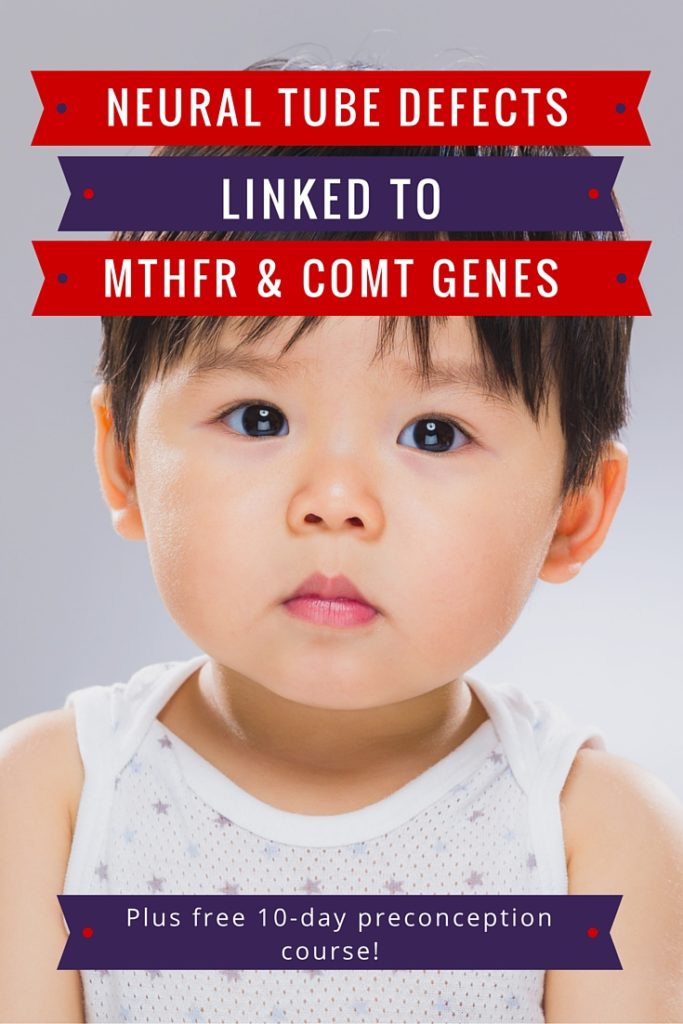Anencephaly, spina bifida and encephalocele are the most common types of Neural Tube Defects (NTD’s), and develop due to the failure of the neural tube to close between the 3rd and 4th week of embryonic development.
While science still debates the true cause of NTD’s, there can be no doubt that the introduction of mandatory fortification of breads with folic acid has reduced the prevalence of NTD’s.
One thing we can be sure of however, is folate’s crucial role in the production of healthy DNA in the rapidly growing embryo, with the demand for folate being the highest during this period than throughout the rest of a human’s lifetime.
Therefore, the ability of the mother to provide adequate levels of active folate to a growing child is critical for the growth and development of the fetuses brain and organs.
As a positive MTHFR mutation can have a large impact on the body’s ability to create adequate levels of active folate, and keep the level of homocysteine down, many scientific studies have been done looking at the association of the MTHFR gene, homocysteine and the development of NTD’s.
However, another key gene within the methylation pathway, COMT, (catechol-O-Methyltransferase) which contributes to homocysteine synthesis has also been indicated in contributing to NTD’s. Late last year a Chinese study looked at the relationship between the COMT and MTHFR genes and the risk of neural tube defects occurring.
In this study all women with terminated fetuses, still born babies or live newborns with neural tube defects were included in the study together with women who had had a healthy pregnancy. They then analysed each of them for diet, lifestyle (they all came from the same province in China) and then looked at their MTHFR and COMT genes. In the group that had had the issues with pregnancy, the incidence of the homozygous MTHFR C677T gene was 32.8 % higher than in the unaffected group. MTHFR A1298C was not found to have an effect on NTD’s, where as a homozygous MTHFR C677T mutation did increase the risk by 39% and a heterozygous by 30%. The association was even greater when they looked at anencephaly (Anencephaly is the absence of a major portion of the brain, skull, and scalp that occurs during embryonic development.) A homozygous C677T mutation increased the risk by 72% and a heterozygous mutation by 59%), when compared to women who did not carry the mutation.
An interaction between homozygous COMT rs737865 and homozygous MTHFR C677T was found, whereas the better-known COMT V158M was not found to increase Neural Tube Defect risk when combined with any form of a MTHFR C677T mutation.
So what can we take away from this study?
Well, interestingly, out of the 1000 Chinese women that took part in this study, 78% did not take any form of folate supplementation during their preconception period. All women, even those without an MTHFR gene mutation, should be taking a folate supplement. For women carrying MTHFR mutations, this really is a greater priority when both preparing for conception and throughout the entire pregnancy and breastfeeding period.
If levels of folate are already low in the diet, homocysteine is elevated (because there is not enough folate) and a MTHFR mutation is present, the risk of NTD’s forming is increased by almost 40% and anencephaly by almost 80% if you are homozygous for the MTHFR C677T gene mutation.
However, it is important to remember that many women upon discovering they have a positive MTHFR mutation have gone on to have successful, healthy and thriving pregnancies and babies – it is possible! But it is all about preparing your body correctly for pregnancy, and support your MTHFR and folate levels the best you can.
If you’d like to know the best action steps to take if you do have MTHFR and wish to fall pregnant (or are having issues doing so), we recommend you join our 10 day FREE email course: 10 days to a healthy pregnancy with MTHFR, or join Carolyn Ledowsky on her step by step guide to fertility course here.









